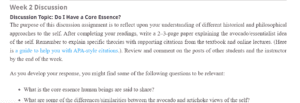The Self
What are some differences/similarities between the avocado and artichoke views of the self?
Avocado is a green-skinned, yellow flesh fruit with a seed at its center. The seed at its center is often giant and, when dried and planted, can produce an entire new avocado tree with more fruits. The Artichoke is a flower head of a similarly named plant. The flower comprises numerous layers that will leave nothing if all are peeled off. The Artichoke has no core; hence, once the layers are peeled, it ceases to exist. A layer of Artichoke cannot produce a plant of a similar kind. In the avocado view, a person is viewed as having a stable and enduring self at one’s core. In the artichoke view, a person is viewed as a protean with a stable core that is not enduring (Mitchell, 2018).
Do you need an unpublished version of “The Self”? Contact us
What is the essential human beings are said to share?
Two examples of the avocado viewpoint are Judaism and Christianity traditions. In both views, the traditions assert that humans are imperfect yet are created to serve God and love Him while at it. Similar to avocados, human beings on the outside appear ordinary, while at the core of a person’s heart, they are divine. God is sought from the heart. Just as an avocado’s primary purpose lies in its core, the seed, to produce a similar kind of fruit, so are human beings. Humans are indeed what is in their core (heart) and not what is viewed on the outward physical self. Humans are created in God’s likeness, making every one unique (Marajan, (n.d.).
What is the relationship between human and divine nature?
The artichoke viewpoint about human nature is that a person is believed to exist with no particular purpose (Marajan, n.d.). Society makes people adapt to the changes it makes. When there are constant changes in society, human beings adapt by adding layers to their lives, character, and being. In the same way, an artichoke has a base but no core, and so do human beings; they use the bases to help choose life paths. The bases also help persons to direct their conduct in life. Examples of Artichoke viewpoints are described in expressions such as ‘we are gonna die anyway,’ ‘Carpe diem,’ or ‘You Only Live Once.’ People with the artichoke viewpoint have no conduct of what is wrong or right, have no rules that govern their lives, and sometimes have difficulty making decisions. This is because such people have no core or guiding principles. Such people believe that every person determines their fate, has a right to make choices, and takes responsibility for the same.
Other Related Post: Ehud Type
References
Mitchell, H. B. (2018). Roots of Wisdom: A Tapestry of Philosophical Traditions. Cengage Learning.
Mahajan, N. (n.d.). Avocado and Artichoke view of self. https://www.scribd.com/document/440096816/AVOCADO-AND-ARTICHOKE-VIEW-OF-SELF-docx
ORDER A PLAGIARISM-FREE PAPER HERE
We’ll write everything from scratch
Question
Week 2 Discussion
Discussion Topic: Do I Have a Core Essence?

The Self
This discussion assignment aims to reflect upon your understanding of different historical and philosophical approaches to the self. After completing your readings, write a 2–3-page paper explaining the avocado/essentialist idea of the self. Remember to explain specific theories with supporting citations from the textbook and online lectures. (Here is a guide to help you with APA-style citations.). Review and comment on the posts of other students and the instructor by the end of the week.
As you develop your response, you might find some of the following questions to be relevant:
-
- What is the essential human beings are said to share?
- What are some differences/similarities between the avocado and artichoke views of the self?
- What is the relationship between human and divine nature?

